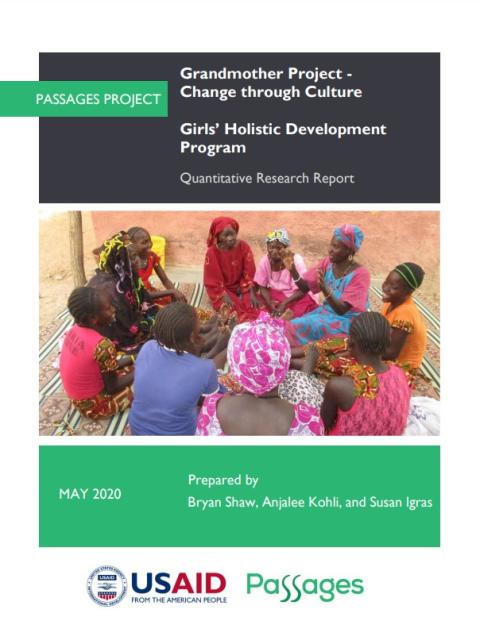- Report
- 1 May 2020
Grandmother Project – Change through Culture Girls’ Holistic Development Program Quantitative Research Report
- Author: Bryan Shaw, Anjalee Kohli, Susan Igras

As part of the USAID-funded Passages Project, Georgetown University’s Institute for Reproductive Health, part of the Center for Child and Human Development, has provided technical assistance through a Realist Evaluation approach to guide understanding and scale-up of the Girls’ Holistic Development Program, implemented through the American and Senegalese non-government organization Grandmothers Project – Change through Culture.
The Girls’ Holistic Development Program promotes change in culturally embedded social norms and practices related to girls’ education, early marriage and pregnancy, and female genital mutilation/cutting (FGM/C) by both empowering girls and creating an enabling environment where family and community actors support change for girls.
This quantitative, cross-sectional study to assess the effects of the Girls’ Holistic Development approach after 18 months of activity in the Némataba Commune in Senegal was undertaken in partnership with Cheikh Diop University’s Institute for Training and Research in Population, Development, and Health Reproduction. Seven villages that had received the full intervention package were involved in the study, and seven non-intervention villages were purposively selected for comparison.
Surveys were conducted with all eligible very young adolescent girls, and with grandmothers, or women of ‘grandmother’ age. The survey measured gender attitudes, social norms (through vignettes), self-efficacy, intergenerational communication, and target behaviours and behavioural intentions related to early marriage and pregnancy, girls’ education, and FGM/C.
The data demonstrate considerable positive effects of the intervention on intergenerational dialogue and support, self-efficacy of VYA girls, caregivers, and grandmothers, and on social norms related to FGM/C, girls’ schooling, child marriage, and early pregnancy. The report is available in English, while the executive summary is available in both English and French.
- Countries / Regions:
- Senegal